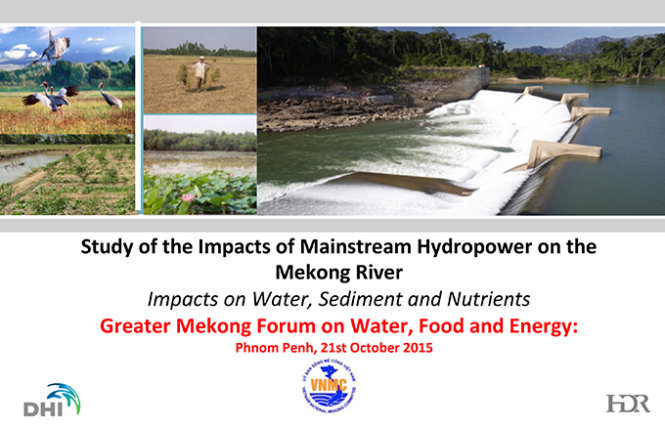A senior official of the Ministry of Agriculture and Rural Development, which has cooperated with the Vietnam National Mekong Committee (VNMC) on a report on the impacts of hydroelectric dams on the Mekong River, has rejected a report presented at a workshop in Cambodia in September.
The report, entitled “Study of the impacts of mainstream hydropower on the Mekong River – Impacts on water, sediments and nutrients”, was in fact performed by international experts, Deputy Minister of Natural Resources and Environment Nguyen Thai Lai told Tuoi Tre (Youth) newspaper via telephone on Sunday.
Prof Nguyen Ngoc Tran, former vice chief of the State Committee for Science and Technology of the Government, wrote an article published on the news website of Tuoi Tre (Youth) newspaper, that the report, presented in 51 slides at a workshop in Cambodia in September, drew a dangerous conclusion that will have an adverse impact on the environment, and the lives of nearly 18 million Vietnamese people in the region.
The report was presented at the three-day 2015 Greater Mekong Forum on Water, Food, and Energy in Phnom Penh on September 21, said Tran.
The US$3.5 million report, funded by the government of Vietnam, said that the impact of the 11 river hydropower dams on the Mekong Delta, mostly in Laos and Cambodia, was negligible, said Prof Tran.
The report, jointly conducted by VNMC and its foreign partners, Danish Hydraulic Institute (DHI), will also be presented at another upcoming international conference, said Prof Tran who earned most of his diplomas in mathematics and mechanics in France in the 1960s-1970s.
Impacts on water level, salinity, the risk of massive flooding due to a dams’ failure or collapse, and the risk of riverbank erosion in Vietnam’s territory were mentioned in four slides in the report, Tran said.
Tran told Tuoi Tre on Sunday that Deputy Minister of Natural Resources and Environment Nguyen Thai Lai had already signed off on all related official documents of the project as the deputy chairman of the VNMC.
The research and evaluation have been done with great caution, having passed through many state agencies at many levels before completion, Lai told Tuoi Tre.
According to Lai, the research and evaluation is done through an international tender, and so it is built on the knowledge of an international team of experts from Denmark, the U.S., and the World Bank.
No Vietnamese expert joined the making of the report, Lai added.
Though the data is provided by relevant state agencies in Vietnam, only the international experts were the ones who undertook the research, Lai told Tuoi Tre.
Lai insisted that the construction and completion of the 11 hydropower projects on the Mekong mainstream would cause significant concern regarding the environment and livelihood of the people in the countries downstream.
Only in the middle part of the river, where countries were planning to complete or begin multiple dams on the mainstream, would and enormous and powerful impact be felt on the Mekong River in general, and on the development of the Mekong Delta of Vietnam specifically, he asserted.
As Vietnam is located at the end of the river, it will be one of the countries that will be most severely affected, Lai said.
Regarding the previous article of Prof Nguyen Ngoc Tran published on Tuoi Tre about the negligible impact of those dams, Lai said that a previous conclusion drawn from the report, which has been submitted to the ministry, stated differently.
"The report concludes that there are multiple impacts, and the overall impact is very large and unacceptable,” Lai told Tuoi Tre.
Lai said that when the Government of Laos began to build a hydropower dam on the Mekong mainstream in 2011, he was the one who said that the harmful effects of climate change would come faster than the scenario predicted by international scientists.
Like us on Facebook or follow us on Twitter to get the latest news about Vietnam!



















































